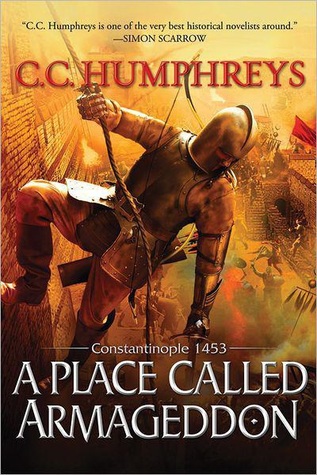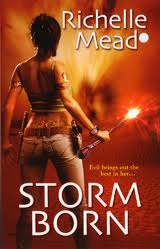I received this book for free from in exchange for an honest review. This does not affect my opinion of the book or the content of my review.

A Place Called Armageddon
on September 1, 2012 and has 481 pages.
Explore it on Goodreads or Amazon
Review source: Sourcebooks Landmark
It’s the battle in 1453 that sees the end of an era in Constantinople.
My Take
Oh man, Humphreys has me by the first page of the prologue! I’m tense with fear at the description he provides of the Turk flowing to the walls of Constantinople. Heck, I wanna just open the gates and tell ’em to have at it. How can he possibly fight against a mass of men like this? And yet the men fighting to save Constantinople do last…for longer than anyone could have expected.
While Humphreys is a romantic who skims the truth of Constantinople, I do appreciate his even-handedness in presenting both sides. As sad as it was to see so beautiful a city cut down, for so many men to die, Constantinople needed to die as it was. It had become so corrupt, decayed. It needed to be reborn like the phoenix. It’s been a Muslim city for almost 600 years now and it is thriving. Only the future can tell if Istanbul will last longer than Constantinople’s 1,100-plus years. Yes, I’m taking poetic license with the facts.
Humphreys wrote a good story weaving in the personal with their own smaller dramas. I was disappointed that his lyricism petered out after his prologue and became more of a soap opera framed by battle. The manner in which he incorporated the history of this famous battle was superb and while, as I mentioned above, I appreciate that he gave us a look on both sides of the wall, it took some of the tension out of it for me. I’m not sure if it became too balanced or if it was simply my pre-existing knowledge of the outcome that made the difference.
There are many betrayals in this story: Theon’s stand out the most and Sofia has her share. It’s a nasty metaphorical twist, using the beautiful flower of the Judas tree; it and its pink petals keep cropping up everywhere. Theon has met with Hamza in the emperor’s garden amidst the Judas tree’s falling pink flowers, so many petals settling on his clothes that he chooses “not to wipe them off. There were so many, there didn’t seem much point”. Much like the Turkish army outside the walls of Constantinople.
After all that Theon’s done to her, he wants a kiss??
Okay, we know Leila has been shooting at him, but I must say I never expected her actions at the end nor his response. It does tend to resolve that pesky triangle that was looming, however. Interesting.
I did appreciate the epilogue at the end with a last look back at some of the principal characters on whom Humphreys had focused, summing up their lives seven years later. Although, I’m still confused about Sofia. Did she return? Is she still in Ragusa? What happened to Thakos?
Overall, it’s a sad story with its Cain and Abel, youthful love versus mature, life’s dramas that will twist the path you follow.
The Story
A young man visits a seer, one who sees his future, warns of missteps if undertaken too early or too late.
Like the seer, he is of a practical mind and sends Hamza to Genoa to persuade the doge to uphold their treaty. To persuade Constantinople’s envoy to choose the Turk over the reluctant pope and Genoans.
Leila has her own agenda and it includes Gregoras helping her to salvage the “manual of alchemy writen by Jabir ibn Hayyan, whom others called Geber. …[and]…his answers to life itself.”
It’s a rendezvous in Chios for Grant, Gregoras, Longo, and Sofia. A very disappointing one for Longo has no gold to pay Gregoras for his accomplishment and he is a man who has lost everything. Who has spent the last seven years throwing his life into harm’s way.
It seems Gregoras will be going to Constantinople anyway.
The Characters
Mehmet is the fiery twenty-one-year-old sultan of all the Turks, a gardener, the future Conqueror, the Fatih. Hamza is thirty and the former sultan, Murad’s, cupbearer and lover.
Leilah is a prophet? seer? and Mehmet comes to see her for her visions. I like that she’s been brought up with a practical sense. Her mother’s visions and her father’s focus on knowledge. She has two men important in her life now and she would see to it that both are safe for as long as she needs them. It is curious how her heart changes…
Candarli Halil Pasha is Mehmet’s grand vizier, the Elephant; Ishak and Karaca are belerbeys of Antaloia and Rumelia, the Ox and the Buffalo. Then Zaganos, the Cheetah, and Bataoglu, the Bear. Both converts. Both in the sultan’s favor. Then Imran, the agha of the janissaries. A man undecided. Urban Bey is the mother of the mammoth cannon.
Johannes Grant is a Scot, but thought to be German, renowned for his skill with Greek Fire and the mechanics of war (Dorothy Dunnett also makes use of his character in her House of Niccolò series and in this same city).
Genoa
Gregoras “Rhinometus” Zoran is Theon’s twin brother, his face marred by the lack of a nose. It only needs one more campaign to have the funds to build his retirement. But there is not enough money in the world to entice him to fight for Constantinople, the city of his birth and disgrace. They thought he had opened the gate at the Hexamilion in 1446 and they cut off his nose. He will not fight there, but Giustiniani has another contract. Find Grant and take him from the pirates who hold him prisoner.
Sofia has been brought here from Constantinople by her thug of a husband, Theon Lascaris, leaving their two children behind — Minerva who demanded and her book-loving Thakos. He had thought to use her to sway the Genoans to aid Constantinople. The twins had fought from the beginning: Theon, the elder, had the intellect while Gregoras had the physical skill. Gregoras had thought they had a truce, but Theon took the woman Gregoras loved through treachery and betrayal. Theon’s greatest happiness is that he hurt Gregoras and Sofia. His continuing happiness is to hurt anyone.
Giovanni Giustiniani Longo is a deeply religious Genoan, a successful mercenary leader. Soon to be the supreme commander. Enoz the Sicilian and Amir the Renegade are his lieutenants. Gregoras met Amir when Gregoras was a slave aboard the ship Amir commanded. The ship caught on fire, the slaves’ chains were slipped to allow them their best chance of survival, and Gregoras stayed aboard to help Amir fight the fire. Only the two of them. Giustiniani and his men came upon them and took them on.
Anatolia, Turkey
Achmed is going to war, but is first determined to leave his family as prepared as he can should he never return. His daughter, Abal, was too weak from starvation to fight off the illness; his wife, Farat, wails for her loss. And Achmed is plowing his land. Mounir is seven and Mustaq is five. It is to Raschid he comes with his promise of gold.
Constantinople
Constantine Palaiologos, the Despot of the Morea, is now Emperor of Constantinople. Theodore of Karystenos is still alive, still “captain of archers for the Imperial Guard and the man who had taught Gregoras everything”. George Sphrantzes is “court historian and friend to emperors past”.
Flatenelas is Gregoras’ uncle and the captain of the grain barge.
The Cover and Title
Whoa, at first glance, I thought I was looking at an orange science fiction cover due to the very smooth helmet the character is wearing. A closer look reveals absolute chaos and armor. Metal gauntlets, leather boots, and he’s ready to scale this massive brick wall, sword in hand to join in the battle.
It certainly was that…A Place of Armageddon. Even the sultan was appalled. It certainly suits the quote from Revelations.





